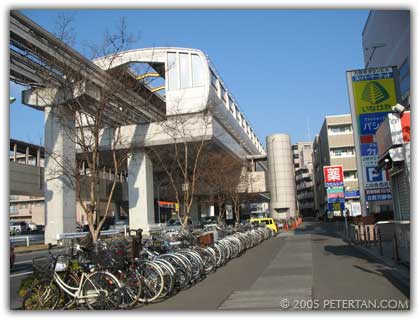
As no programme was planned for the morning, there was no need to get up as early as usual. We commuted via the monorail and train to Hachioji. The one thing common at all train stations are the rows of neatly parked bicycles. I have seen more bicycles than motorcycles all the places I went. Walkways in Tokyo are wide and very bicycle-friendly.

It was a short ride from Manganji to Takahatafudo. The sun was shinning brightly but the temperature was chilly. The elevator could only fit one wheelchair. One by one, we waited for our turn to get to the ground level, proceed to the Keio Line Takahatafudo Station and catch the train to Hachioji.
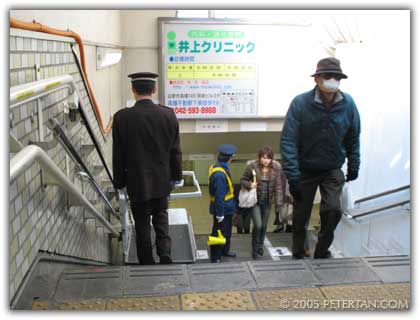
At the station, we had to take the Garavanta down the stairs. There were no elevators. At the other end of the tunnel, we took another Garavanta up to reach the platform. This was a routine we performed every evening coming back from Hachioji. It took the three of us about thirty minutes to move from the platform to the station entrance.
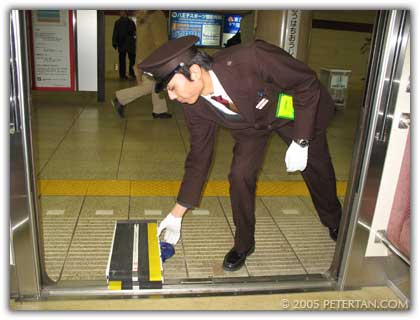
The Station Master at the Keio Hachioji was already waiting for us when we arrived. When the door opened, he placed the ramp to enable our wheelchairs to disembark from the train. This is the efficiency of the rail system in Tokyo. Whenever we board the train, the Station Master would place the ramp for us to get into the train and then inform the arriving station where another ramp would be ready and waiting for us.
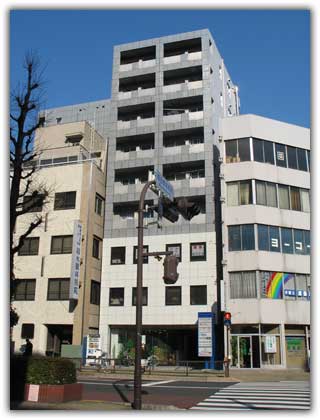
This is where the Human Care Association is located. We spent nearly two weeks here learning the Independent Living Programme for People with Disabilities. What have we learnt? We were enlightened with the fact that with a proper support system, even the most severely physically impaired person can achieve independent living. This is what we will be bringing back to Malaysia and set in motion a transformation that will liberate many of our peers.
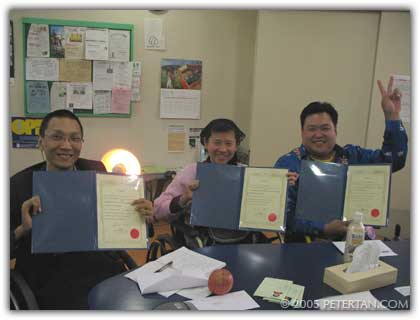
We spent the morning preparing our report for JICA Japan. An evaluation of our training was scheduled for the afternoon. After lunch, Ishizaka-san from JICA together with Akiyama-san and Tsutsumi-san listened while each of us presented our report for the Evaluation Meeting. On the whole, we were happy with the training. We had learnt more than we had expected. The staff of Human Care Association, Centre for Independent Living Hino, Machida Human Network and HANDS Setagaya had been more than generous in imparting their knowledge to us. Additionally, JICA and JICE had made sure that all our other needs were looked after. At the end of the meeting, Ishizaka-san presented us with a certificate from JICA. Tsutsumi-san presented us each with a present. She also passed to me a button hooked made by Hippie-san especially for me. With that, I can now wear clothes with button.
Human Care Association had planned a Farewell Party for us later in the evening. With some time to kill, I went to the welfare shop nearby to look for a gel cushion accompanied by Maejima-san. Welfare shops like this sell assistive aids for various kinds of disabilities and also for the elderly. The shop, unfortunately, did not stock the cushion. I had to place an order if I wanted it. I decided to look for one back in Malaysia instead. After the welfare shop, we then headed to the Y100 shop to do some last minute shopping.
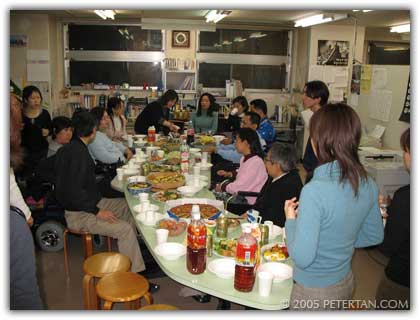
Japanese hospitality is one that will be difficult to forget. We were treated to a scrumptious array of food from authentic Japanese fare to pizza and pasta. Present at the party were Nakahishi-san, Nakahara-san, Akiyama-san, Tsutsumi-san, Maejima-san, Satio-san and PA Coordinators and staff of Human Care Association. We were requested to present a song and we sang Rasa Sayang, a traditional Malay song. In reciprocation, staff of Human Care Association sang a Japanese folk song and the Japanese version of If You Are Happy And You Know It. This final evening was great fun where we chatted freely about anything and everything. Again, we were present with presents each, this time by the Human Care Association.
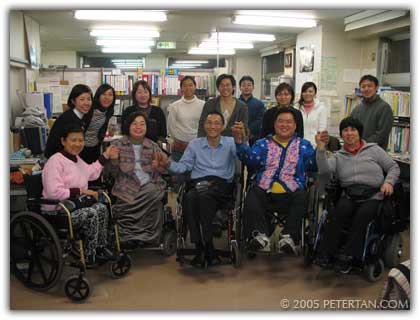
When it was time to leave, we got together for a group photo. This will be one experience that I will never forget. We spent two wonderful weeks learning things that changed our lives as people with disabilities forever. We were well taken care of and all our needs were fully looked after. Japan is a beautiful country with beautiful polite people. It is difficult not to want to come back here again.

Glad to read that you are safely home and that you not only enjoyed the short stint in Japan but you also learnt a lot. I am sure people in wheel chairs in Malaysia can look forward to a better life and benefit from your experience in Japan.